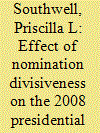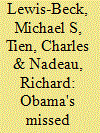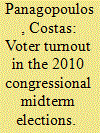|
|
|
Sort Order |
|
|
|
Items / Page
|
|
|
|
|
|
|
| Srl | Item |
| 1 |
ID:
121608


|
|
|
|
|
| Publication |
2013.
|
| Summary/Abstract |
In "The Dog that Didn't Bark: The Role of Canines in the 2008 Campaign," Diana Mutz (2010) argues that dog ownership made voters significantly less likely to vote for Barack Obama in the 2008 presidential election. We examine this claim further. Although President Obama has owned a dog since shortly after his 2008 election, we argue that Bo's presence most likely did little to improve his owner's chances of being reelected in 2012. Rather, the apparent significance of dog ownership uncovered by Mutz is due largely to key variables being omitted from the analysis. Using the same data, we show that Obama didn't so much have trouble with dog owners in 2008 as he had trouble with conservative, rural, Southern whites, who, for reasons we examine, are more likely than other Americans to own dogs. Accordingly, we suspect that Bo failed to boost Obama's vote tally in 2012. While we recognize the tongue-in-jowl tone of portions of Mutz's article, this tale is an important one, and is consistent with recent research linking racial attitudes to levels of support for Barack Obama. We also argue that while scholars are often wise to include control variables such as "South" in studies of political attitudes and behavior, it is important to consider the variety of politically relevant characteristics that such variables may be capturing.
|
|
|
|
|
|
|
|
|
|
|
|
|
|
|
|
| 2 |
ID:
096378


|
|
|
|
|
| Publication |
2010.
|
| Summary/Abstract |
This research examines the effect of disgruntlement among primary and caucus voters who supported U.S. presidential nomination losers-a potentially divisive nomination process. I analyze the general election voting behavior of primary and caucus voters in the 2008 presidential election to determine if differences exist between supporters of the winning nominee in each party and backers of other candidates who also sought the nomination. A multivariate analysis of the determinants of "loyal party vote" suggests that Clinton and Edwards supporters showed a significantly higher degree of defection in the general election, although this behavior did not occur among people who voted for Romney or Huckabee in their state's primary or caucus.
|
|
|
|
|
|
|
|
|
|
|
|
|
|
|
|
| 3 |
ID:
105270


|
|
|
| 4 |
ID:
096205


|
|
|
|
|
| Publication |
2010.
|
| Summary/Abstract |
Barack Obama was denied a landslide victory in the 2008 presidential election. In the face of economic and political woe without precedent in the post-World War II period, the expectation of an overwhelming win was not unreasonable. He did win, but with just a 52.9 percentage point share of the total popular vote. We argue a landslide was taken from Obama because of race prejudice. In our article, we first quantify the extent of the actual Obama margin. Then we make a case for why it should have been larger. After reviewing evidence of racial bias in voter attitudes and behavior, we conclude that, in a racially blind society, Obama would likely have achieved a landslide.
|
|
|
|
|
|
|
|
|
|
|
|
|
|
|
|
| 5 |
ID:
110630


|
|
|
|
|
| Publication |
2011.
|
| Summary/Abstract |
This article demonstrates that racial prejudice was strongly related to the state-level nonblack vote in the 2008 presidential election, which featured the first African American candidate from a major party, Barack Obama. Additional tests show that while prejudice also explains shifts in the nonblack vote between 2004 and 2008, its influence on voting in the 2000 and 2004 elections was modest at best. Furthermore, there is no relationship between racial attitudes and state-level presidential approval of George Bush in 2008. Taken together, the findings suggest that prejudice does not have a pervasive influence on political behavior and opinion. Instead, the effect appears to have been triggered by the presence of Barack Obama on the ballot. Had there been less prejudice among the American voting public, Obama would likely have won an electoral vote landslide.
|
|
|
|
|
|
|
|
|
|
|
|
|
|
|
|
| 6 |
ID:
105423


|
|
|
|
|
| Publication |
2011.
|
| Summary/Abstract |
Against the backdrop of the 2008 presidential election, a watershed event in terms of electoral participation, many speculated that renewed interest in voting would spill over into the 2010 cycle, resulting in a meaningful uptick in voter turnout in the midterm elections overall. Turnout was expected to be especially robust among Republicans eager to regain their numbers in 2010, capitalizing on Democratic withdrawal fueled by voters' frustration with President Obama, congressional Democrats, and the struggling economy. In 2008, an electorate energized around an historic contest and unprecedented levels of voter mobilization helped to drive more citizens to the polls on Election Day than ever before (Panagopoulos and Francia 2009). An estimated 131.1 million Americans voted for president, representing 61.6% of the eligible voting population (McDonald 2009). Voter turnout among eligible voters in 2008 was 1.5 percentage points higher than in 2004, when 122.3 million voters participated in the presidential election (Bergan et al. 2005). The 2008 election thus marked the third consecutive presidential election cycle in which voter turnout increased, reversing a trend of declining participation that began in the 1960s (McDonald 2009). In fact, national turnout in recent presidential elections has rivaled modern highs in the level of electoral participation that occurred in the 1950s and 1960s.
|
|
|
|
|
|
|
|
|
|
|
|
|
|
|
|
|
|
|
|
|